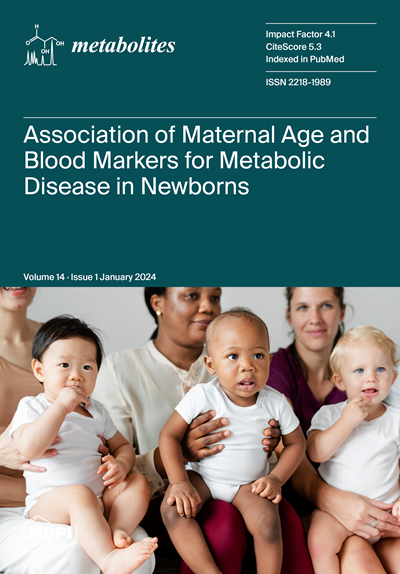Metabolomic Effects of Liraglutide Therapy on the Plasma Metabolomic Profile of Patients with Obesity
IF 3.4
3区 生物学
Q2 BIOCHEMISTRY & MOLECULAR BIOLOGY
引用次数: 0
Abstract
Background: Liraglutide, a long-acting glucagon-like peptide-1 receptor agonist (GLP1RA), is a well-established anti-diabetic drug, has also been approved for the treatment of obesity at a dose of 3 mg. There are a limited number of studies in the literature that have looked at changes in metabolite levels before and after liraglutide treatment in patients with obesity. To this end, in the present study we aimed to explore the changes in the plasma metabolomic profile, using liquid chromatography-high resolution mass spectrometry (LC-HRMS) in patients with obesity. Methods: A single-center prospective study was undertaken to evaluate the effectiveness of 3 mg liraglutide therapy in twenty-three patients (M/F: 8/15) with obesity, mean BMI 40.81 ± 5.04 kg/m2, and mean age of 36 ± 10.9 years, in two groups: at baseline (pre-treatment) and after 12 weeks of treatment (post-treatment). An untargeted metabolomic profiling was conducted in plasma from the pre-treatment and post-treatment groups using LC-HRMS, along with bioinformatics analysis using ingenuity pathway analysis (IPA). Results: The metabolomics analysis revealed a significant (FDR p-value ≤ 0.05, FC 1.5) dysregulation of 161 endogenous metabolites (97 upregulated and 64 downregulated) with distinct separation between the two groups. Among the significantly dysregulated metabolites, the majority of them were identified as belonging to the class of oxidized lipids (oxylipins) that includes arachidonic acid and its derivatives, phosphorglycerophosphates, N-acylated amino acids, steroid hormones, and bile acids. The biomarker analysis conducted using MetaboAnalyst showed PGP (a21:0/PG/F1alpha), an oxidized lipid, as the first metabolite among the list of the top 15 biomarkers, followed by cysteine and estrone. The IPA analysis showed that the dysregulated metabolites impacted the pathway related to cell signaling, free radical scavenging, and molecular transport, and were focused around the dysregulation of NF-κB, ERK, MAPK, PKc, VEGF, insulin, and pro-inflammatory cytokine signaling pathways. Conclusions: The findings suggest that liraglutide treatment reduces inflammation and modulates lipid metabolism and oxidative stress. Our study contributes to a better understanding of the drug’s multifaceted impact on overall metabolism in patients with obesity.利拉鲁肽疗法对肥胖症患者血浆代谢组学特征的影响
背景:利拉鲁肽是一种长效胰高血糖素样肽-1受体激动剂(GLP1RA),是一种成熟的抗糖尿病药物,已被批准用于治疗肥胖症,剂量为 3 毫克。关于利拉鲁肽治疗肥胖症患者前后代谢物水平变化的文献研究数量有限。为此,本研究旨在利用液相色谱-高分辨质谱法(LC-HRMS)探讨肥胖症患者血浆代谢组谱的变化。研究方法本研究是一项单中心前瞻性研究,旨在评估 3 毫克利拉鲁肽对 23 名肥胖症患者(男/女:8/15)(平均体重指数为 40.81 ± 5.04 kg/m2,平均年龄为 36 ± 10.9 岁)的治疗效果,患者分为两组:基线期(治疗前)和治疗 12 周后(治疗后)。使用 LC-HRMS 对治疗前和治疗后两组的血浆进行了非靶向代谢组学分析,并使用 ingenuity pathway analysis (IPA) 进行了生物信息学分析。结果代谢组学分析表明,161 种内源性代谢物(97 种上调,64 种下调)出现了显著的失调(FDR p 值≤ 0.05,FC 1.5),且两组之间存在明显的差异。在明显失调的代谢物中,大部分属于氧化脂类(氧化脂素),包括花生四烯酸及其衍生物、甘油磷酸酯、N-酰化氨基酸、类固醇激素和胆汁酸。使用 MetaboAnalyst 进行的生物标志物分析显示,氧化脂质 PGP(a21:0/PG/F1alpha)是前 15 种生物标志物中的第一种代谢物,其次是半胱氨酸和雌酮。IPA分析表明,失调的代谢物影响了与细胞信号传导、自由基清除和分子转运相关的通路,主要集中在NF-κB、ERK、MAPK、PKc、血管内皮生长因子、胰岛素和促炎细胞因子信号传导通路的失调。结论研究结果表明,利拉鲁肽治疗可减轻炎症反应,调节脂质代谢和氧化应激。我们的研究有助于更好地了解该药物对肥胖症患者整体代谢的多方面影响。
本文章由计算机程序翻译,如有差异,请以英文原文为准。
求助全文
约1分钟内获得全文
求助全文
来源期刊

Metabolites
Biochemistry, Genetics and Molecular Biology-Molecular Biology
CiteScore
5.70
自引率
7.30%
发文量
1070
审稿时长
17.17 days
期刊介绍:
Metabolites (ISSN 2218-1989) is an international, peer-reviewed open access journal of metabolism and metabolomics. Metabolites publishes original research articles and review articles in all molecular aspects of metabolism relevant to the fields of metabolomics, metabolic biochemistry, computational and systems biology, biotechnology and medicine, with a particular focus on the biological roles of metabolites and small molecule biomarkers. Metabolites encourages scientists to publish their experimental and theoretical results in as much detail as possible. Therefore, there is no restriction on article length. Sufficient experimental details must be provided to enable the results to be accurately reproduced. Electronic material representing additional figures, materials and methods explanation, or supporting results and evidence can be submitted with the main manuscript as supplementary material.
 求助内容:
求助内容: 应助结果提醒方式:
应助结果提醒方式:


